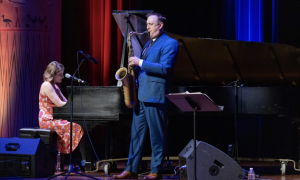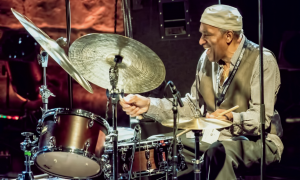Home » Jazz Articles » Catching Up With » Meet Mulgrew Miller
Meet Mulgrew Miller
In a trio or quintet, I sometimes tend to become more focused on melodic improvising. And especially in a quintet, I'll have a more concise approach to playing. But as a solo performer, I try to be more orchestral and use more of the entire instrument.
All About Jazz: You were born in Greenwood, Mississippi, and grew up listening to blues, gospel and R&B music. What attracted you to jazz?
Mulgrew Miller: The thing that pulled me toward jazz was jazz itself. By the time I really discovered what jazz was all about, I'd been playing rhythm and blues-mostly for dances. And I'd played gospel music in my church since childhood. In fact, just about all the music I played growing up was permeated with blues and gospel. I was also studying classical music, and in high school I had a trio. We played at cocktail parties, but we really didn't know what we were doing. We were going toward jazz, but we really didn't know how to approach it.
But the thing that really did it was seeing

Oscar Peterson
piano1925 - 2007
AAJ: Attending Memphis State University was a real key to your development as a jazz pianist, wasn't it?
MM: I met

James Williams
piano1951 - 2004

Donald Brown
pianob.1954

Phineas Newborn, Jr.
piano1931 - 1989
AAJ: Your first high profile job as a jazz musician was with the

Duke Ellington
piano1899 - 1974
MM: Yes, I was asked to join the Ellington band in 1977, but I had subbed for the band's regular pianist while I was still at Memphis State. After I graduated I went to Boston, then to Los Angeles. I ran into the band again and they asked me to play with them for three weeks. It turned into three years.
AAJ: Being part of the Ellington band must have been a real learning experience.
MM: It was—both musically and personally. I was only 21 years old when I joined. It was a real experience working in a big band, and especially with Ellington's music. And touring with a big band and all the different personalities definitely was a unique experience too.
AAJ: From the Ellington band you went directly into playing for singer

Betty Carter
vocals1929 - 1998
MM: I had gotten to know

Cedar Walton
piano1934 - 2013
AAJ: You spent eight months with Betty Carter, then moved on to join

Woody Shaw
trumpet1944 - 1989
MM: No doubt about it. Woody Shaw wasn't merely a great trumpet player and bandleader. He was a visionary. He certainly left his mark on the jazz repertoire in terms of compositions. And he also left his mark on the language of jazz in terms of the trumpet. I'm thinking of the way he was dealing with music—the language that he used when improvising really explored new areas on the trumpet that hadn't been dealt with before, at least at that level of sophistication. And his compositions were very forward-looking in terms of harmonic colors.
AAJ: After working with Woody, you joined

Art Blakey
drums1919 - 1990
MM: Actually, I had a short stint playing with

Johnny Griffin
saxophone, tenor1928 - 2008

Tony Williams
drums1945 - 1997
AAJ: But somehow you eventually managed to get your own career going as a leader while doing all that. Tony Williams didn't tour nearly as much as the other leaders you played for. Did that give you the time to get your own groups going?
MM: I would say my work as a leader actually started the last year I was with the Messengers, and then really picked up when I was with Tony. So that coincided with doing my initial recordings for the Landmark label in 1985.
AAJ: You've recorded 10 albums as a leader, and worked in a variety of contexts, from a basic trio to the quintet lineup on Wingspan that featured alto sax and vibes. Looking back, do you have a favorite among those recordings—or a preferred lineup?
MM: No, in terms of both recordings and lineups. There are moments on each of those recordings that if I could pick and choose and put together, I'd have something I could really brag about. But there isn't a specific recording I think stands out. And I like both the trio and quintet formats. I still have a regular trio with

Richie Goods
bass
Karriem Riggins
drumsb.1975

Steve Wilson
saxophoneb.1961

Steve Nelson
vibraphoneb.1954
AAJ: Given the consistent critical acclaim for your recordings as a leader, it's surprising that your last one, Getting to Know You, came out back in 1995. Surely you've received offers to record. Why have you chosen not to?
MM: I have had several offers, but I haven't pursued them aggressively. Some have been better than others, but I haven't had any really strong, concrete offers that seem rewarding enough to me. You know, I've made enough recordings already. I don't have to do a free record for anybody.
AAJ: Clearly the recording industry—especially in jazz—has a pretty dismal track record in providing the quality of support and distribution needed to give these recordings a decent shot to make it in the marketplace. Some jazz musicians like

Gary Bartz
saxophone, altob.1940
MM: Well, first of all, we could do a whole interview on this subject. Let's just say the record industry is totally screwed up. And I have entertained thoughts about putting my own records out. But I'm not sure if I have both the focus and the time to get involved in a complex project like that.
AAJ: How do you approach performing solo? Do you have a set program, or do you just go with the flow?
MM: I'll have a general outline in terms of repertoire of what I'm going to play before I start. But sometimes I'll make spur-of-the-moment decisions to change what I'm going to perform. There are a lot of factors that will determine that, from the type of venue where I'm performing to the reaction of the audience.
AAJ: From a technical standpoint, how does your keyboard approach change from a quintet or trio setting to a solo performance?
MM: In a trio or quintet, I sometimes tend to become more focused on melodic improvising. And especially in a quintet, I'll have a more concise approach to playing. But as a solo performer, I try to be more orchestral and use more of the entire instrument. After all, it's just you, so you need to come up with different things to make the music more interesting. In essence, I do things that are more pianistic.
AAJ: You've been appearing on quite a few recordings lately, from releases by Diane Reeves and

Rene Marie
vocals
Steve Turre
tromboneb.1948

Gary Burton
vibraphoneb.1943
MM: For the last couple of years I've been doing duo appearances with the Danish bassist,

Niels-Henning Orsted Pedersen
bass1946 - 2005

Jimmy Blanton
bass, acoustic1918 - 1942
Tags
Interview
Mulgrew Miller
AAJ Staff
oscar peterson
James Williams
Donald Brown
Phineas Newborn Jr.
Boston
Los Angeles
Betty Carter
Cedar Walton
Woody Shaw
Johnny Griffin
Art Blakey
Tony Williams
Gary Bartz
Diane Reeves
Rene Marie
Steve Turre
Gary Burton
Niels-Henning Orsted Pedersen
Jimmy Blanton
Richie Goods
Karriem Riggins
Comments
PREVIOUS / NEXT
Support All About Jazz
 All About Jazz has been a pillar of jazz since 1995, championing it as an art form and, more importantly, supporting the musicians who make it. Our enduring commitment has made "AAJ" one of the most culturally important websites of its kind, read by hundreds of thousands of fans, musicians and industry figures every month.
All About Jazz has been a pillar of jazz since 1995, championing it as an art form and, more importantly, supporting the musicians who make it. Our enduring commitment has made "AAJ" one of the most culturally important websites of its kind, read by hundreds of thousands of fans, musicians and industry figures every month.








 Buy Now
Buy Now



















